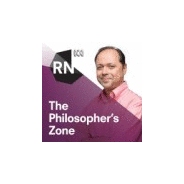This week on the Philosopher’s Zone, we’re looking at a couple of people you might not think of as philosophers at all. One of them aspired to be a scientist of the mind. The other, though, was something of a philosopher, something of a mystic and something of a shaman. His name was Carl Gustav Jung and his relationship with an older man, Sigmund Freud, is the subject of A Dangerous Method, a new film directed by David Cronenberg, written by Christopher Hampton and starring Michael Fassbender as Freud, Viggo Mortensen as Jung and Keira Knightley as the woman who presence proves to be something of a catalyst in their relationship.

Kultur & Gesellschaft
The Philosopher's Zone - Program podcast Folgen
The Philosopher's Zone looks at the world of philosophy and at the world through philosophy. The program addresses the big philosophical questions and arguments. It also explores what philosophical analysis can contribute to our understanding of some of the fundamental and perplexing issues that face the world today.
Folgen von The Philosopher's Zone - Program podcast
132 Folgen
-
Folge vom 15.04.2012A Dangerous Method
-
Folge vom 08.04.2012Honourable intentionsHuman consciousness is intentional – it’s about something – but what is the relationship between my consciousness and the objects of which I’m conscious? And, in particular, how does this work when the objects don’t even exist, like Santa Claus and Pegasus? This week, we investigate an old philosophical issue.
-
Folge vom 01.04.2012Philosophy for RepresentationalistsOver four decades, the Gavin David Young Lectures in Philosophy at the University of Adelaide have become a very significant series with many distinguished contributors from across the globe.. This year, the speaker was Frank Jackson, Professor of Philosophy at ANU. His subject was ‘Philosophy for Representationalists’: perceptual experiences represent the way things are. For example, visual perceptual experiences typically represent how things are in front of us. We can pass this information on in many ways, but we humans most often pass it on using words and sentences. What do these commonplaces about experiences and language tell us about the contents of our experiences and the contents of our words and sentences?
-
Folge vom 25.03.2012Extending the mindWhere does the mind stop and the rest of the world begin? Some philosophers are now arguing that thoughts are not all in the head. The environment has an active role in driving cognition; cognition is sometimes made up of neural, bodily, and environmental processes. Their argument has excited a vigorous debate among philosophers and this week we discover what the fuss is about. We hear from two proponents of the extended mind thesis from one of its critics, Robert Rupert, associate professor of philosophy at the University of Colorado, Boulder.
